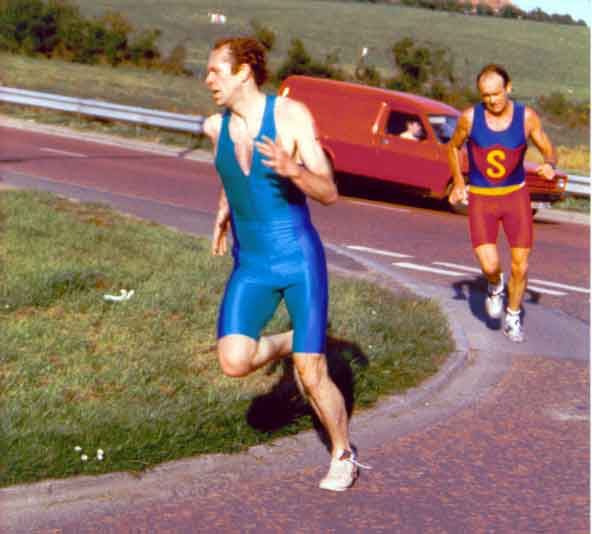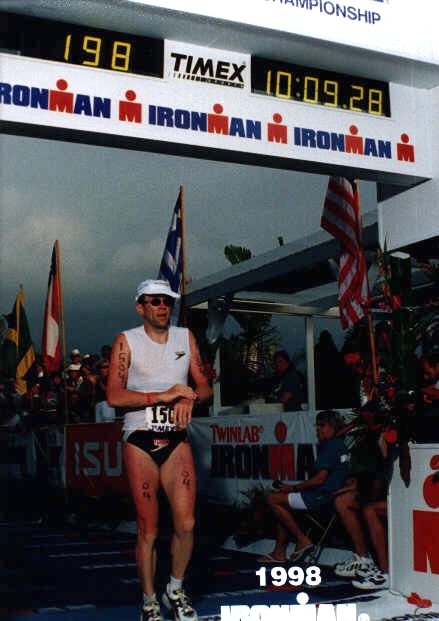Olympian Triathlon Club
History
Home
Constitution
Castlewellan
Aquathon
History
Membership
Forms
Club Photos
1
Club Photos
2
Club Photos
3
Club Photos
4
Calendar
of events
Newsletter
Triathlon
Ireland Race Licence Form
FAQs
Email ideas
for site content

Kevin Morgan sprints away from Superman, Desi McHenry, at the finish of Liam Ball triathlon.
Olympian - Roots, Records and Racers
Back in the 70’s, the forerunner of today’s Belfast
Marathon attracted fields of down to four. In fact, in one memorable race,
there was but one finisher: the four starters set off at an insane pace,
two were quickly weeded to the roadside, and then with around 20 miles
gone the second of the two remaining found himself so far adrift that he
dropped out. No sooner done than news fed back from the front that the
leader was in dire straits and walking. Cajoled by his supporters the drop-out
restarted, caught the leader who himself then dropped out, and struggled
on to win. Seemingly shambolic perhaps, but that winner, John McLaughlin,
went on to run a 2h 15m in the following years. Who’s running that fast
here nowadays? Marathon running then was an esoteric pastime for real runners
and beyond the ken of a pedestrian population.
Jim Fixx was soon to be shaking Americans out of
their armchairs and into a running boom which spread an epidemic of mass-participation
marathons across the western world. But amongst the new breed there were
those for whom a mass challenge was no challenge; they needed a new twist,
a new flavour to their burger, something to set them apart. And they saw
it in a new niche nutcase-American fad: Triathlon. Competitors, we learnt,
would swim in the surf, then without even a quick towelling, jump on their
bikes to ride vast distances, and follow that finally with a sun-baked road
run. It was just mad enough, and importantly, just doable enough, to satisfy
that urge to be slightly different, perhaps slightly superior. This was
not crossing Antarctica on foot, sled and frostbite, but for the semi-detached
parent of 2.4 children, it was an expression of individuality. And unlike
real adventure, it was fun.
Thanks to Con O’Callaghan of the local Sports Council,
triathlon arrived in Ireland before many European countries, including,
incidentally, England, Wales and Scotland. And one of our own men, runner
Desi McHenry, contested that first race late in the summer of '82. He finished
the Craigavon-based 4 mile run, ½ mile swim, 6 mile cycle, ½
mile swim, 2 mile cycle - they don’t make ‘em like they used to - in a non-controversial
third place. But true to his mould and prescient of many teething-troubles
in local triathlon, Desi jointly won an event the following year crossing
the finish line in the wrong direction, something which rankled to no small
degree with swimmer Tom Heaney who thought he was winning as he arrived
up the finish straight in the correct direction. Crossing finish lines in
opposite directions was still an occurrence as late as 1990 when Kevin Morgan
won in Tralee - two minutes after Dublin’s Tilly brothers had inadvertantly
shortcutted to short-lived victory. That marshalling has progressed significantly
since then is moot.
Triathlon then was for the hard and carefree; wetsuits
were banned and Irish tansition areas were often flashed scenes of public,
goose-pimpled, duo-gender nudity. Aero bars were not yet dreamed of, far
from it - bikes ranged from the latest butcher’s delivery model to the
pedigree road racer. Anything that could go, would go. And as one story
goes, by the time a prominent well-fed Dublin counsel toodled into the
harbour-side Transition 2 on his protesting, mini-wheeled, town-gent’s
foldaway, the race bar him was over, gantries had been dismantled, and he
was left looking very much a lonely man caught on the wrong side of the
dock.
Many triathletes used the Long Distance Swimming
Association’s short swims as practise for wetsuitless triathlons. The reason
triathletes were generally hopeless at the things was that triathletes, it
was tenuously argued, were fit and skinny and didn’t possess the natural
thermoprotection of the bulkier sea swimmers. That the very best sea swimmers
were also slim was set aside as one might a biblical paradox. Early triathlon
bike-section miles were risky, numb-toed, I-couldn’t-feel-the-brake-lever
episodes of hopeful enthusiasm and what-am-I-doing-here? naval contemplation.
Somewhere in the thick of it all a small band of
pioneers gravitated to Olympia Leisure Centre for much-needed swim practise.
Coached by Neill Grainger, whom is still to be found on the fringes of triathlon,
the fast lane, which was not particularly fast, was our current slow lane,
and the slow lane, which made our current slow lane look like barracuda,
was our current fast lane. Swim sessions consisted of a fairly typical
thrashing out of mindless lengths followed by ten minutes of a mixed,
no-holds-barred corruption of water-polo or, on one occasion, a surreal
bastardization of the rudiments of synchronized swimming: they could have
sold tickets to watch that pool-load of spluttering, knob-kneed old men
raising legs like broken masts to an incredulous café-window gallery.
Long distance sea swimmer, Anne Mageean was part
of that set (but of the slender-kneed sylph variety), and a fast-lane leader
at that. In 1984, Anne and five others, including an instrumental Jim
Lavery, conspired to form a closet cabal with designs on stirring the
loose collection into a constituted club. And so OLYMPIAN TRIATHLON CLUB
was born.
Marathon runner, Kevin Morgan, already Ulster Triathlon
Champion in his first year, was an early convert from the fledgling Andersonstown
Tri Club which never really made it off the ground. In those early years,
Anne, Kevin and Jim effectively ran the club - and, with Con O’Callaghan,
the UBITA - through a small committee. Soon, there were weekly group run
and cycle sessions, calendars, coaching courses, marshalling courses, organizers’
courses, rules and regulations, sponsors, a 16-event 1600-competitor Milk-Tryathlon
series, schools’ championships and more, and Olympian members had a pivotal
role in almost all of it. Leading the way, it was Olympian Triathlon Club
which, against much criticism, pushed through the compulsory hardshell
bike helmet law, long before the cycling authorities saw fit to follow
suit.
But triathlon is principally about competition, and
OTC has had more than its fair share of excellent competitors:
During an unbroken series of wins including Irish
Championships, Alison Hamilton finished 20th in the 1993 Manchester World
Championships in the star-packed elite category. Alison achieved national
representation in rowing, running and triathlon. She would admit to rowing
being her first love, and that’s were she found it; Alison married New
Zealand Olympic bronze medallist rower, Wilfred Prismhooter III, and is
currently racing to beget enough babies to complete a family coxless four.
Also in 1993, Eugene Galbraith was outsprinted for
3rd in the World Championships 20-24 age category, a race won by Tim DeBoom
of Ironman fame. Earlier that year in Wicklow, Eugene had won the Irish
Olympic Distance Championship by a full eight minutes while posting the
fastest time in each discipline. His string of victories included three
Irish Senior and three Irish Junior titles. Most impressive was his cycling,
evidenced by his 53min Ulster record for 25 miles. At his best, Eugene was
effectively unbeatable on the local scene, one of his most treasured wins
being a record-setting Liam Ball where he undercut the figures of powerhouse
Englishman, Richard Hobson.
2h28m marathon runner Kevin Morgan had won the Ulster
Championship, the Ulster Grand Prix and the Irish National Series before
his best race, the 1990 Irish ½-Ironman Championship in Sligo, where
he posted 3h50m - still a record - to win by 17mins ahead of Owen
Fahy of the USA, with Noel Munnis, a former Olympian swim coach and multiple
triathlon title holder, third. Kevin finished third-in-agegroup in the
1998 Roth Ironman in 9h45m and later that year went one better in finishing
World No2 agegrouper in the Hawai’i Ironman World Championships. He has
also won the Irish Veterans’ title on a number of occasions and has an
olympic distance silver medal from the European Masters in Finland.
Aidan O’Callaghan has been a long-time stalwart of
the club and is the current Irish Veterans’ Sprint Champion, a title he
added to his several wins when finishing amongst the elites in Kinsale
last year.
For some time now a member of Olympian, Desi McHenry
totted up countless race wins, including the Irish Veterans’ title, as
a member of Innisfree. He was an early Hawai’i Ironman competitor and tirelessly
seems to line up for just about every race on the calendar.
There is probably something worthwhile to write about
former Irish League player Eamon Hill’s second recent rise to stardom,
but until he confirms such in detail we’ll just have to live with the illusion
of success.
Hushed voices have referred to Steven Richmond as sex on legs, but
most of those men have now left the club. It’s unclear as to whether it’s
a mince, pose, affection or just the gait of the veritable natural, but
whatever it is, it’s turning heads, often to ten metres behind his behind
to see the leader coming to start his last lap. This does not easily account
for a sterling sub-11-hour 2002 Ironman Austria, but then completion of
the course is left to trust.Trudy Brown claims as her major achievement a dogged compeletion of the tw-day 208 miles 1998 Maracycle on two Fig Rolls, six pints of a black rehydration fluid, and a sole 40 miles preparatory training toodle. However, as Ireland’s 2003 National Series Champion there is more to say about Trudy. That will wait, however, until she sedulously details her wondrous feats.
Lots of others have also performed with considerable success: Joanne Bingham, John McLaughlin, Clare White, Rachael Hamilton, etc, but until they pass on the information they will remain unsung heroes.
The problem with a hard sport like triathlon has
been just that - it’s hard, or at least perceived as hard, and most people
don’t like hard - so the cultivation of serious mass-participation
would have required some guru-inspired sleight of presentation. In the absence
of that guru, Irish numbers fell after the initial rush and, until recently,
hovered just above viability. Olympian has fared better than most, but
even within our club low numbers of committed members - and those committed
are principally committed to racing - have often left most of the burden
of administration upon too few.
Over the last few years an influx of spirited new blood has breathed a new vibrancy into Olympian, the success of the Castlewellan event being but one consequence and, in turn, its success a spur to further success. 2003 saw the inception of a much-need revamped constitution which, for one, tilts at the long-ignored challenge of youth development, the most important ingredient for Olympian’s longevity.
Secretary: Trudy Brown email Trudy
Treasurer: Sean Morgan email Sean
